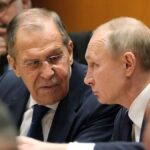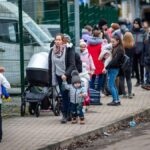Artem Agvanian is an 18-year-old college freshman who grew up in a section of eastern Ukraine that Russian President Vladimir Putin claims is separate from the rest of Ukraine.
His mother’s side of the family has Russian roots. When he visited there last summer, he and his parents chose to speak to each other in the Russian language.
In contrast, Viktor Meleta is a 41-year-old Cranston resident who works with robot technology in Massachusetts. He and his family came to the United States as refugees a few years ago, leaving a city in western Ukraine where their chosen language was Ukrainian.
Their heritage and languages are different, but the two Ukrainian natives now living in Rhode Island are in agreement about one thing.
Live updates: Russia intends to replace Ukraine government, US official says
They both side with Ukraine and reject Putin’s claims.
By Wednesday, they told The Providence Journal, Russia’s president had already violated the sovereignty of their native land. Don’t be fooled by false reports of genocide in eastern Ukraine or by other misinformation that exaggerates the significance of cultural differences between some Ukrainians, they said.
A “message of ethnic conflict … has been persistently conveyed by Russian propaganda,” Agvanian said.
“It’s a purely media notion that has been created … to give a pretext for an invasion,” said the student, who hails from Mariupol, a key port in the eastern region of Donetsk.
As of late Thursday, his hometown on the coast was not inside the enclave held by separatists.


What we know: Why is Russia invading Ukraine? Could it be the start of WWIII?
On the ground: Will US help Ukraine in war vs. Russia? American troops bolster NATO in Europe
But Putin had declared the entire Donetsk region to be independent from Ukraine and subject to troop movements.
Lots of talk about protecting Russian-speaking Ukrainians from other Ukrainians accompanied Putin’s manipulations in a prelude to the full-scale invasion he launched Wednesday night.
“My family is Russian-speaking,” Agvanian said. “… We never had any problems using Russian in our daily language. We haven’t been persecuted, or even offended, in any case.”
Agvanian’s mother has cultural ties to Russia and his father to Armenia, but his parents identify as Ukrainian, he said.
Meleta and Agvanian had not crossed paths previously, but they agreed to meet up on the Brown University campus Wednesday and share some thoughts as Putin kept the world on edge.
Both say they want to do whatever they can to keep Ukraine’s crisis from being ignored — a specter that Agvanian refers to as a “threat of oblivion.”
‘His defining mistake’: US lawmakers attack Vladimir Putin over Ukraine invasion, Republicans call for tougher sanctions
“It’s important for people to see perspectives of people like me, like Viktor,” he said. “That’s important because it keeps the information flowing. … It ensures that we’re not going to be forgotten.”
Meleta and his wife came to Rhode Island with their two sons and her parents in 2018, joining relatives.
Meleta says they made the pilgrimage as refugees seeking religious freedom. They are Baptists.
Meleta said he had been so disturbed by the prospect of a Russian invasion lately that he hadn’t talked about the issue much. His parents and his brothers remain in Ukraine.
‘The world will hold Russia accountable’: Leaders react to ‘horrific events’ in Ukraine
He likened Putin’s assertions about Ukrainian territory to the childish claims of a bully trying to take someone else’s toy in a classroom.
In this case, it’s not clear whether any teacher can come to the rescue.
“It’s very complicated in our world,” said Meleta, who says Ukrainians, not Americans, must do the work of defending Ukraine.
He said he wishes Ukraine had been more successful at acquiring weapons it needs, including an effective air-defense system.
When the subject came up, Meleta also said he thinks it’s appropriate for Agvanian to stay in the United States if a full-blown war breaks out.
What to know: Where is Ukraine? Where are NATO members? A guide to post-Soviet Eastern Europe
Agvanian said he has not been called yet. Prior to Russia’s latest attacks, he was reassured by the presence of Ukrainian troops in the region where he grew up.
“I guess there are many ways to maximize your utility for your homeland,” said the Brown student. “I can do my best by staying here and highlighting the situation and describing it.”
Ukraine’s “final aim,” he adds, is “not full-fledged war but peace.”
“Peace can be achieved,” he said, “both militarily and through means of diplomacy.”
This article originally appeared on The Providence Journal: What was life like in Donetsk? Ukrainians denounce Putin’s propaganda




